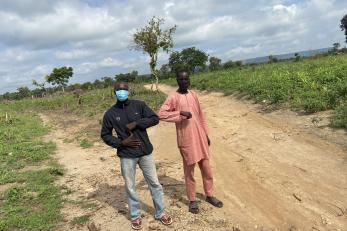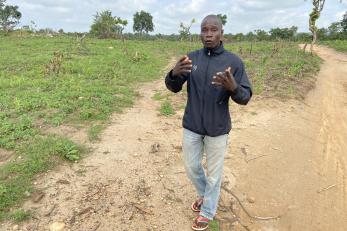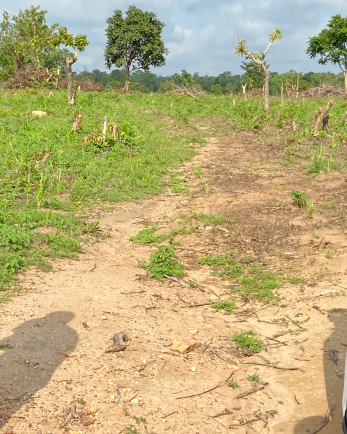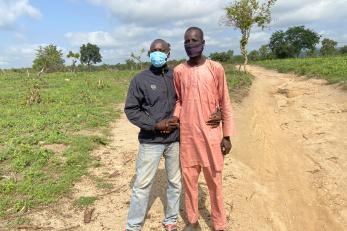An interest-based approach to farmer-herder conflict resolution

Conflicts between farmers and herders are rampant in states across Northern Nigeria, with an estimated 3,600 deaths since 2016 and thousands displaced as a result. In Kogi state, farmers and herders often clash due to farm encroachment, crop destruction, lack of grazing routes and killing of animals. While the source of the dispute is over scarce natural resources, tensions have taken an ethnic/religious undertone due to the overwhelming population of nomadic herders being Muslim Fulanis and farmers being Christians from various ethnic groups.

Determined to find a lasting, mutually beneficial solution to the incessant issue of cattle encroachment and crop destruction in Bakumba community of Lokoja LGA in Kogi state, a group of farmers and herders, who participated in the Interest Based Negotiation and Mediation (IBNM) training organized by Community Initiatives to Promote Peace (CIPP) in January 2020, met during one of their monthly peace meetings. As such, they were able to identify the root cause of a brewing conflict - the lack of a defined grazing route to allow passage of their herds from the Fulani settlement to the area allocated for grazing.
Dangara Moses Emmanuel, a 35-year-old youth leader and Christian farmer from Bakumba community spoke on the approach his community has taken to maintain peace since receiving their training.
“After the training, we reached out to the Fulani herders and started putting some of our training into practice and now we are able to relate as brothers and sisters. Prior to the training, we used to believe that because one Fulani herder encroaches on a farm and destroys crops then they are all the same but the training has shown us that that is not the case,” he said.
In the past, both groups would try to hold peace meetings but would only meet once a year. Now, the community meets on the last Friday of every month, with consistent representation from the farmer and herder groups.
Speaking on one of their biggest achievements as a community to date, Dangara said that previously there was no way for the herders to come out of their settlement with their cattle without encroaching on farms and that used to cause a lot of problems. “Then we started communicating with the herders and they brought up the issue of laabi (cattle route) saying that they want to maintain peace but the lack of a path will only lead to continued encroachment if they have nowhere to pass.”
The committee visited the area in question and immediately decided to open up a path for the herders to pass through.

39-year-old Yusuf Idris, a Fulani pastoralist from Bakumba community shares how the new laabi has improved their relationship with the farmer community. “By the grace of God, we have been living together with Christians in the community and we don’t have many issues. In the last one to two years, we’ve been living in peace because of the training we received. The challenge is that because of the population of both farmers and herders, there seems to be a struggle for resources because the farmers have to farm and we need land to graze our cattle so we asked them to open the route and they did. Even though there are some places that have not been opened yet, we have been working hand in hand with traditional leaders from the farming communities and they have been very helpful but there are some farmers with whom conversations are still going,” says Yusuf.
“Thanks to the training, both groups came together and recognized that it is only when we put aside grudges and work together that there’ll be lasting peace. Before the intervention we only met once in a year but after the training we started meeting monthly. I am confident that even if Mercy Corps isn’t around tomorrow, we are thankful because we will still continue our meetings and work together for peace,” he added.
Community’s past approach to farmer/herder conflicts
In the past, reports of crop destruction and capturing of cattle in retaliation would go to the Village head, 45-year-old James Dodo who said, “Before, when they find a cow on their farm, it will be held for ransom, or reported to vigilante groups etc. the best way to avoid it is to open the laabi.”
Ten years of no grazing route in the community meant that farmers had to relocate their farms to areas on top of the hill to prevent encroachment.
According to James, “when they started damaging our crops, some of us had to move our farms uphill. Previously when we farm, we don’t leave paths for cows to pass and that led to crop destruction from the cows. Farmers and herders will now come to me to start negotiating. This has been going on for long but we thank God for the intervention. This year, everything has reduced, unlike before. The herders came with the request to open the route and as farmers we tried to open the path for them and there has been less damage to our crops. There are still some other minor issues but those are things we can easily handle. Now, even the level of complaints brought to me has reduced drastically and I can go for days tending to my farm without getting any reports.”
Forward looking

On the future of peace in their community, Dangara said “We want to encourage our Fulani brothers to bring their children to attend the community school. It’s important for them to begin mixing at a young age to nurture the understanding from a young age and to maintain peace.”
With the successful resolution of this cattle route issue, members of the community peace committee - equitably comprising farmers and herders who participated in CIPP mediation activities – have been charged to tackle other issues like competition over the dwindling water supply which limits the water available for tending to crops and cattle alike.
About Interest Based Negotiation and Mediation
Most of the conflict situations in which Mercy Corps operates require substantial negotiation, meaning back-and-forth communication aimed at reaching an agreement on an issue where some interests are shared or different, and others conflict. Interest-Based Negotiation (IBN) is a process that enables traditional negotiators to become effective problem solvers. This approach separates the people from the problem, focuses on the interests and not the positions, creates options for mutual gain and defines objective criteria against which to judge the fairness of the end agreement. Mediation is the process of assisted negotiation through the help of a neutral third party (i.e., a mediator) where community leaders and institutions use the negotiation framework to help parties resolve their disputes.
About CIPP
Mercy Corps is implementing the Community Initiatives to Promote Peace (CIPP), a five-year peacebuilding program funded by the United States Agency for International Development (USAID).
CIPP’s aim is to prevent violent conflict in the most at-risk communities across Katsina, Kaduna, Plateau, Kogi, Kano and Benue states in Nigeria’s North West and Middle Belt regions.
CIPP works with community leaders, women, government officials and state-level actors to improve their ability to peacefully manage disputes; to strengthen Early Warning and Early Response (EWER) mechanisms for timely response to violent conflict, and facilitate collaboration among communities with government agencies, civil service organizations and local leaders to address root causes of conflict.
CIPP is implemented in partnership with Pastoral Resolve (PARE), Interfaith Mediation Centre (IMC), Savannah Centre for Diplomacy, Democracy and Development (SCDDD), and the African Radio Drama Association (ARDA).